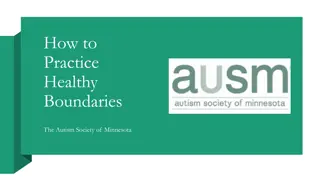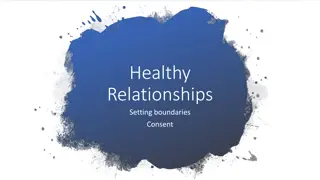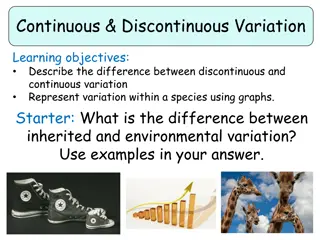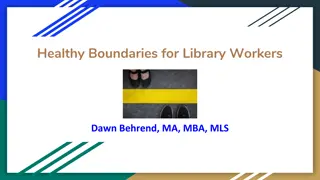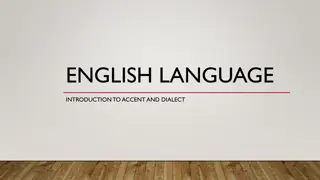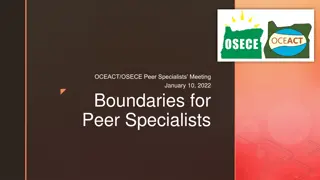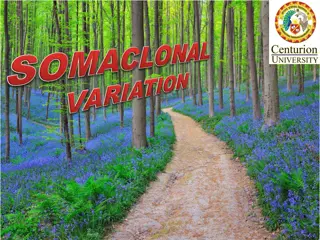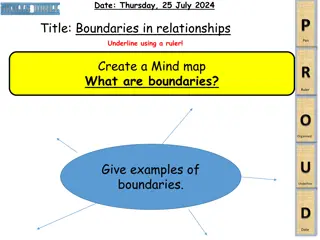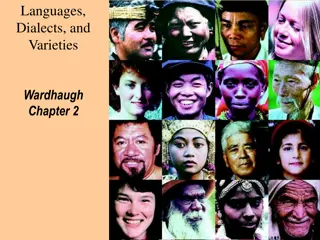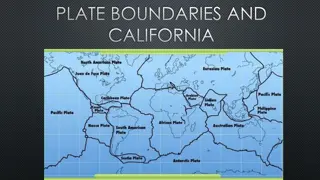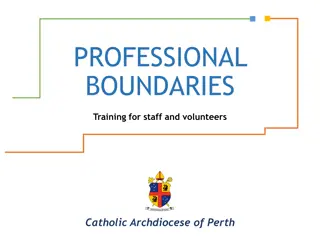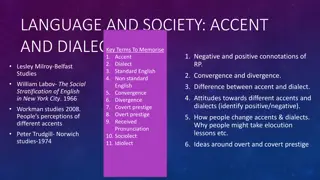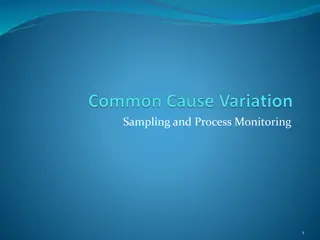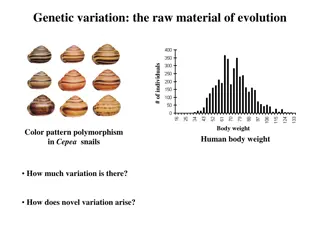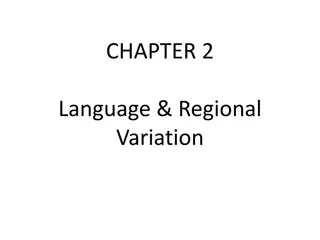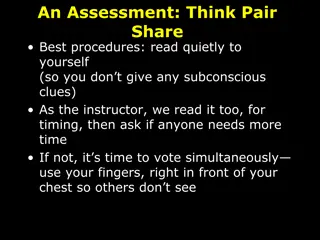Understanding Dialects: Language Variation and Boundaries
Dialects are clusters of language features that differentiate groups of speakers, focusing on vocabulary, pronunciation, and grammar. Languages are dialects with societal significance, influenced by social and political factors. Regional dialects in the US vary based on factors like age, gender, ethnicity, and profession. Non-rhoticity is a feature where sounds are dropped in certain contexts. Explore the nuances of dialects through illustrations and examples, such as the Boston accent comparison and dialect boundaries based on pronunciation.
Download Presentation

Please find below an Image/Link to download the presentation.
The content on the website is provided AS IS for your information and personal use only. It may not be sold, licensed, or shared on other websites without obtaining consent from the author. Download presentation by click this link. If you encounter any issues during the download, it is possible that the publisher has removed the file from their server.
E N D
Presentation Transcript
Dialects and standards HSSP Week 7, Part II
What is a dialect? Dialect = cluster of language features that differentiate groups of speakers. Things dialectologists usually look at: Vocabulary Pronunciation Grammar
What is a language? Language = a dialect with an army and a navy. Social, political factors. Whether two varieties of speech are called dialects or languages doesn t tell us very much about how similar they are. Different languages, mutually intelligible: Swedish, Norwegian Same language, mutually unintelligible: some dialects of Chinese
Dialects Our focus: regional dialects, or how people s speech varies from place to place. Other dimensions of variation gender age social class profession ethnicity
An illustration of dialect boundaries, based on pronunciation: http://aschmann.net/AmEng/
Dialects I: Boston Siri vs. Boston accent: http://www.youtube.com/watch?v=1wBpSWx Po6o
Non-rhoticity / /s are dropped At the ends of words in isolation before other consonants Some examples card = [k :d] weird = [wi d] square = [skwe ] tuner = [tun ]
But sometimes // comes back Linking / /: when an r-final word shows up before a vowel-initial word, the r stays. car engine Park the car in Harvard Yard Intrusive / /: under certain circumstances, an r gets inserted in between two vowels tuna(r) oil Amanda insists
some other Boston things merry vs. marry vs. Mary wicked! Others?
Dialects II: the South http://www.atlas.mouton- content.com/secure/generalmodules/anae/sa mples/texas_south/vmcgahey/start.html
Some pronunciation things Monopthongization: /a / > [ :] For some speakers, only before voiced Cs or at the end of a word ( ride = [r :d], buy = [b :], fire = [f :r]) For other speakers, before voiceless Cs too! ( night = [n t], nice white rice ) Pin-pen merger Word stress (p lice, c ment, D troit, nsurance, d splay, h tel, gu tar, mbrella)
Some grammar y all and ain t Non-standard past tense forms knowed choosed Double modals I might could do that You might should close the window
Perception of dialects What do you think when you hear somebody speaking in A really strong Boston accent? A really strong Southern accent? An English accent?
What is a standard? Usually we contrast things like Southern American English and Boston English with Standard American English What is SAE? Marked by the absence of major dialectal features Based on a generalized midwestern accent Usually when you say you don t have an accent what you re saying is that you speak SAE. Usually, a standard = prestige variety of a language, spoken by the rich and powerful
Prestige of the standard We learn from various places (school mostly, maybe your parents) that SAE is what you should speak if you want to sound educated. Perception: people who have a strong accent, or use things like double modals, didn t learn English properly. This last point isn t true. Dialects = just as rule-governed as the standard, just slightly different rules. Dialect and intelligence are not linked.
Different methods of enforcing a standard English: nothing official, just schools, the media, etc French: l Acad mie fran aise 40 people (called immortels ) Determine what are French words and what aren t, what is good grammar and what isn t.
Prescriptivism A lot of the time, so-called rules of grammar that you re taught in school, as part of SAE, are entirely made up.
Split infinitives But surely, this is a practice entirely unknown to English speakers and writers. It seems to me that we ever regard the to of the infinitive as inseparable from its verb. And, when we have already a choice between two forms of expression, 'scientifically to illustrate' and 'to illustrate scientifically,' there seems no good reason for flying in the face of common usage. - Henry Alford, 1864
Double negation Declared sinful by Robert Lowth, 18th century English clergyman, because logically one negation cancels out another. Double / multiple negation: Romance, Slavic old English
Preposition stranding Robert Lowth strikes again (after John Dryden, a 17th century poet) "This is an Idiom which our language is strongly inclined to; it prevails in common conversation, and suits very well with the familiar style in writing; but the placing of the Preposition before the Relative is more graceful, as well as more perspicuous; and agrees much better with the solemn and elevated Style."
Dont start a sentence with a conjunction What many people learn in school = conjunctions should only used to join together elements within a sentence. But there s no reason why we can t use them to join together sentences, too.
Different types of rules Rules like don t strand a preposition are prescriptiverules: they tell people how they should speak. Usually made up. What we ve talked about / what linguists study: descriptiverules, which describe how people actually speak. Part of your grammar.
Food for thought Do you think it s important to learn to speak a standard dialect, and to follow prescriptive rules like don t strand prepositions ? Why or why not?


